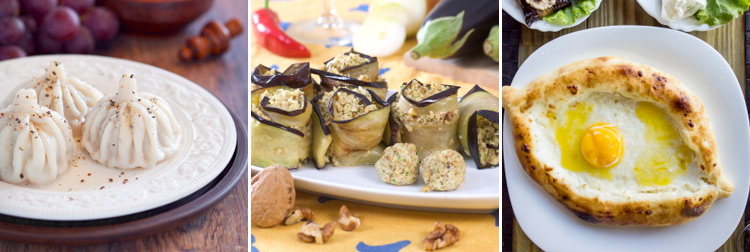The Georgian tradition of hospitality is epitomized by the ceremonial feast of Supra. Supra is celebrated on birthdays, death days, weddings, anniversaries, national holidays, religious holidays, days of commemoration, in honor of a guest, and even ad hoc for no other reason than a fortuitous gathering of close friends. Either way, wine is consumed in ample quantities.
At supra, wine shares equal importance with food. The dinner is comprised of a series of toasts offered by Tamada (“toast master”) to be embellished by the other guests. Topics include love, family, individual dedications, nationalist themes, life and death, and god. Blessings, jokes, anecdotes and humorous recollections are integral. A tourist invited to supra should expect multiple dedications which are usually translated by one of the younger attendants.
The hallmark of Tamada is to be entertaining yet profound. Tamada supervises the entire event from his seat at the head of the table. Seated next to him is Meriqipe (“wine pourer”). Tamada is not to pour his own wine. Toasts are rarely brief and may be segmented by long pauses. Tamada controls the flow of wine as well. Supras of the formal variety have a strict code of conduct. No one at the table drinks until Tamada finishes his toast and proclaims “bolo mde”(“until the end”). This means drink until your glass is empty. Leaving any wine remaining is considered disrespectful to Tamada and the person to whom the toast is dedicated. Death day supra is celebrated on the anniversary of a loved one’s passing. Sometimes remaining drops of wine at the bottom of an empty glass are sprinkled on bread as an offering to the deceased.
Upon summation of his toast, Tamada asks one of the other guests to contribute. The guest must elaborate on the same topic offered by Tamada. Contributions from the other guests should follow. Proper etiquette dictates that everyone at the table has touched glasses before anyone drinks. It is polite to touch another guest’s glass below their grip. This often presents a dilemma as guests contend to touch each others’ glass below grip and the ensuing frenzy can escalate into an extended period of touching glasses which might last as long as the initial toast itself.
Toasts contributed by the guests are considered slightly competitive lending to grandiosity and overt gesticulation. No one should leave the table during Tamada’s initial toast or during a guest’s contribution. Leaving the table at any time for any reason is impolite without express permission from Tamada.
Some supras are more relaxed with less rigid codes of conduct. Impromptu supras held among close friends or to honor a surprise guest are informal and may be conducted in any environment providing a table. This can include garages, picnic tables at a playground or in a field with makeshift accoutrements. In this setting, the atmosphere is more democratic and drinking at will is encouraged as long each toast is honored with a drink. Copious amounts of wine are dispersed which may appear excessive to a foreigner. But, the ability to partake of large quantities and imbibe with finesse asserts masculinity and fortitude which are esteemed qualities for Georgians.
Formal or casual, in a restaurant or in a basement, all supras are forums for song. Ancient polyphonic hymns and European style guitar ballads are performed by nearly everyone at the table. The quality of performance is taken seriously and is usually staggering considering the amount of wine consumed. The recurrence of song increases as the early morning hours approach. A supra is intended to last until the wine is gone.
Georgian Supra should be experienced by any tourist in search of authentic Georgian tradition. Supra is a window to the soul of Georgian identity.


